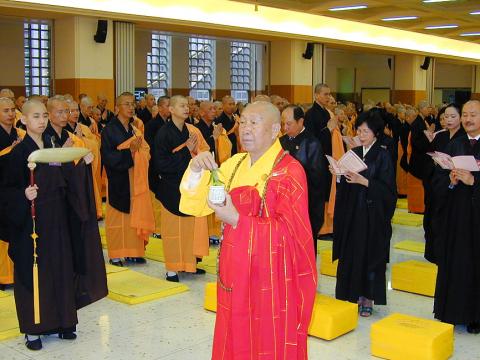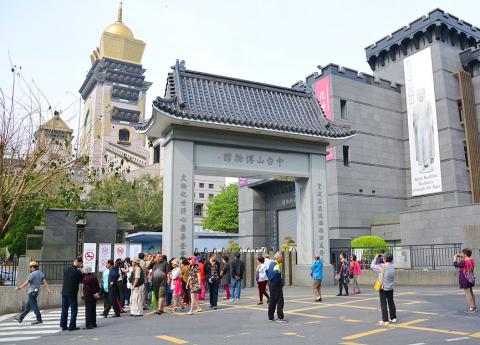Buddhist Grand Master Wei Chueh (惟覺), who founded the Chung Tai Chan Monastery (中台禪寺) in Nantou County’s Puli Township (埔里), passed away at 10:31pm on Friday night, the monastery announced yesterday. He was 88.
The grand master’s death was caused by a regression of marrow regeneration, which resulted in complications, the monastery said.
The monastery was closed yesterday, shutting out buses carrying Chinese tourists.

Photo: Tung Chen-kuo, Taipei Times
It plans to have a scripture reciting assembly from tomorrow until Sunday next week in remembrance of the grand master.
Born in Sichuan, China, in 1928, Wei Chueh was one of the most important religious figures in Taiwan in recent decades, with more than 1,000 monk disciples and hundreds of thousands of followers.
He was credited with preaching Zen Buddhism and reviving Chinese Zen Buddhism.

Photo: CNA
He became a monk in 1963, following Zen master Lin Yuan (靈源) in Keelung’s Shifang Dajue Chan Temple.
Wei Chueh woke at 2am every day when other monks were still asleep to clean up the temple and would salute Buddha at the main hall when other monks were taking noon naps.
He later conducted a retreat in temples in Yilan, Hsinchu and Hong Kong before settling in a cottage in New Taipei City’s Wanli District (萬里).
Firm in belief and living an extremely simple life, he answered the public call to preach and built Lin Chuan Temple beside his cottage in 1987.
His way of preaching was said to be lively and flexible and had no fixed mode.
He used the seven-day Zen retreat and dharma assembly as a way to disseminate Zen teachings, and was said to have contributed to a clean society campaign.
However, due to his growing number of followers, he began to plan the Chung Tai Chan Monastery in Puli, which was inaugurated in 2001.
To nurture the young generation, he also set up an elementary school in 2004, a junior-high school in 2006 and a senior-high school in 2009.
He also constructed the Chung Tai World Museum to showcase Buddhist artifacts and rubbings from inscriptions on stone tablets donated by the Forest of Stone Steles Museum in Xian, China.
Ling Jiou Mountain, another Zen Buddhist society, extended its condolences over Wei Chueh’s death yesterday, saying that the Chung Tai Chan Monastery has contributed to religious exchanges between the two sides of the Taiwan Strait, and helped Chinese access and learn Buddhism.
However, Wei Chueh was not without his critics.
First, some people were not happy with his decision to build the Chung Tai Chan Monastery in a rural area, prompting controversy around land development.
Second, after attending a Buddhism camp at the monastery in 1996, scores of female college students shaved their heads to become nuns. The students’ new looks shocked their parents, with some filing complaints with the Nantou Prosecutors’ Office against Wei Chueh.
However, what was most controversial about him was his political stance.
In contrast with the public perception that a religious figure should keep away from politics, he was a staunch supporter of the Chinese Nationalist Party (KMT) and openly endorsed President Ma Ying-jeou (馬英九) during the 2012 presidential election.
Wei Chueh’s health had deteriorated over the past few months. His last public appearance was on Jan. 17.

DAREDEVIL: Honnold said it had always been a dream of his to climb Taipei 101, while a Netflix producer said the skyscraper was ‘a real icon of this country’ US climber Alex Honnold yesterday took on Taiwan’s tallest building, becoming the first person to scale Taipei 101 without a rope, harness or safety net. Hundreds of spectators gathered at the base of the 101-story skyscraper to watch Honnold, 40, embark on his daredevil feat, which was also broadcast live on Netflix. Dressed in a red T-shirt and yellow custom-made climbing shoes, Honnold swiftly moved up the southeast face of the glass and steel building. At one point, he stepped onto a platform midway up to wave down at fans and onlookers who were taking photos. People watching from inside

A Vietnamese migrant worker yesterday won NT$12 million (US$379,627) on a Lunar New Year scratch card in Kaohsiung as part of Taiwan Lottery Co’s (台灣彩券) “NT$12 Million Grand Fortune” (1200萬大吉利) game. The man was the first top-prize winner of the new game launched on Jan. 6 to mark the Lunar New Year. Three Vietnamese migrant workers visited a Taiwan Lottery shop on Xinyue Street in Kaohsiung’s Gangshan District (崗山), a store representative said. The player bought multiple tickets and, after winning nothing, held the final lottery ticket in one hand and rubbed the store’s statue of the Maitreya Buddha’s belly with the other,

‘NATO-PLUS’: ‘Our strategic partners in the Indo-Pacific are facing increasing aggression by the Chinese Communist Party,’ US Representative Rob Wittman said The US House of Representatives on Monday released its version of the Consolidated Appropriations Act, which includes US$1.15 billion to support security cooperation with Taiwan. The omnibus act, covering US$1.2 trillion of spending, allocates US$1 billion for the Taiwan Security Cooperation Initiative, as well as US$150 million for the replacement of defense articles and reimbursement of defense services provided to Taiwan. The fund allocations were based on the US National Defense Authorization Act for fiscal 2026 that was passed by the US Congress last month and authorized up to US$1 billion to the US Defense Security Cooperation Agency in support of the

‘COMMITTED TO DETERRENCE’: Washington would stand by its allies, but it can only help as much as countries help themselves, Raymond Greene said The US is committed to deterrence in the first island chain, but it should not bear the burden alone, as “freedom is not free,” American Institute in Taiwan Director Raymond Greene said in a speech at the Institute for National Defense and Security Research’s “Strengthening Resilience: Defense as the Engine of Development” seminar in Taipei yesterday. In the speech, titled “Investing Together and a Secure and Prosperous Future,” Greene highlighted the contributions of US President Donald Trump’s administration to Taiwan’s defense efforts, including the establishment of supply chains for drones and autonomous systems, offers of security assistance and the expansion of